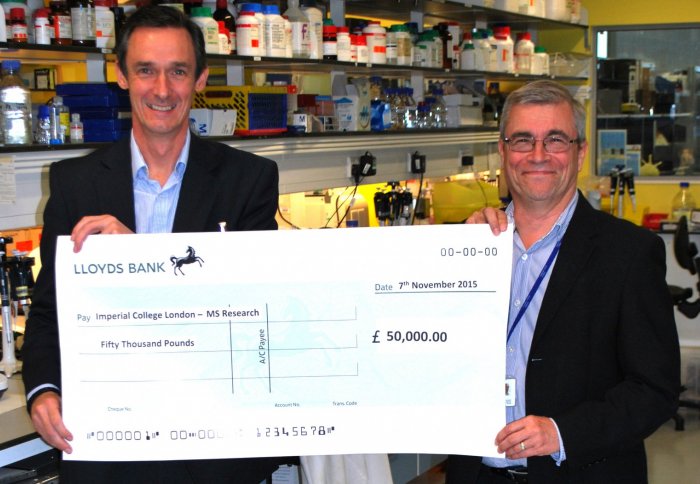MS Researcher Using £50,000 Donation to Further Research
Written by |

Nigel Furmston with Professor Richard Reynolds.
Dr. Richard Reynolds of Imperial College London spoke of the importance of philanthropy to research during a December 2015 visit from Nigel Furmston, a supporter of multiple sclerosis (MS) research, who came to the Hammersmith Campus to award the scientist and his team £50,000 to continue its work into disease development.
Furmston, whose wife Sharon suffers from MS, organized two fundraising campaigns in 2015: a golf event in June that generated £30,000, and a Grand Autumn Ball at Kings Chapel, Buckinghamshire in November, that raised £20,000. Throughout the past six years, Furmston has raised £94,000 to help Professor Reynolds’ research.
“Nigel’s continued support has made such a difference to our research, and I am hugely grateful for his extraordinary efforts this year,” said Dr. Reynolds in a recent Imperial College news release. “Donations like his allow us to go beyond what would be possible through conventional funding alone. His donation will be spent on an important piece of equipment that would otherwise have been difficult to acquire.”
Dr. Reynolds, a professor of cellular neurobiology in the university’s Department of Medicine, is studying the underlying processes of MS progression, in the hope that his efforts will open the way to new therapies to stop or slow the disease.
The donated money will be used to acquire a scanning fluorescence microscope, allowing the scientists to capture brain tissue images of MS patients and study those areas of damage that have been marked with fluorescence.
“I’m delighted to know that Richard and his team are making so many important scientific breakthroughs in MS research and I look forward to continuing my fundraising activities further to support their work” Furmston said.
Multiple sclerosis is characterized by inflammation, demyelination, and axonal loss at various sites throughout the central nervous system. These pathologies lead to a loss of neurological function. Areas of inflammation and demyelination are thought to be responsible for the acute symptoms that occur during relapses, while the progressive loss of neurological function is thought to occur through a combination of a failure of remyelination, axon loss, and neurodegeneration.
Imperial College’s MS research group is looking into the cellular and molecular events that precede these pathological changes, in particular the failure of remyelination and progressive neurodegeneration, according to its website.
There’s no cure for MS, but treatments can help to accelerate recovery from attacks, modify the disease course and manage symptoms.

